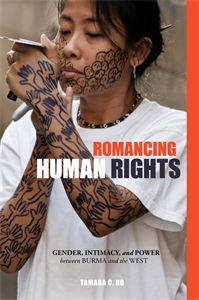Romancing Human Rights: Gender, Intimacy, and Power between Burma and the West
- About the Book
-
When the world thinks of Burma, it is often in relation to Nobel laureate and icon Aung San Suu Kyi. But beyond her is another world, one that complicates the overdetermination of Burma as a pariah state and myths about the “high status” of Southeast Asian women. Highlighting and critiquing this fraught terrain, Tamara C. Ho’s Romancing Human Rights maps “Burmese women” as real and imagined figures across the twentieth century and into the twenty-first century. More than a recitation of “on the ground” facts, Ho’s groundbreaking scholarship—the first monograph to examine Anglophone literature and dynamics of gender and race in relation to Burma—brings a critical lens to contemporary literature, film, and politics through the use of an innovative feminist/queer methodology. She crosses intellectual boundaries to illustrate how literary and gender analysis can contribute to discourses surrounding and informing human rights—and in the process offers a new voice in the debates about representation, racialization, migration, and spirituality.
Romancing Human Rights demonstrates how Burmese women break out of prisons, both real and discursive, by writing themselves into being. Ho assembles an eclectic archive that includes George Orwell, Aung San Suu Kyi, critically acclaimed authors Ma Ma Lay and Wendy Law-Yone, and activist Zoya Phan. Her close readings of literature and politicized performances by women in Burma, the Burmese diaspora, and the United States illuminate their contributions as authors, cultural mediators, and practitioner-citizens. Using flexible, polyglot rhetorical tactics and embodied performances, these authors creatively articulate alter/native epistemologies—regionally situated knowledges and decolonizing viewpoints that interrogate and destabilize competing transnational hegemonies, such as U.S. moral imperialism and Asian militarized dictatorship.
Weaving together the fictional and non-fictional, Ho’s gendered analysis makes Romancing Human Rights a unique cultural studies project that bridges postcolonial studies, area studies, and critical race/ethnic studies—a must-read for those with an interest in fields of literature, Asian and Asian American studies, history, politics, religion, and women’s and gender studies.
- About the Author(s)
-
Tamara C. Ho, Author
Tamara C. Ho is associate professor of women’s studies at the University of California, Riverside. She earned her PhD in comparative literature from UCLA. Her areas of specialization include transnational feminist politics, Asian/American and Chicana/o studies, Anglophone postcolonial literature, Southeast Asia and its diaspora, science fiction, women’s human rights, and religion.Russell Leong, Series Editor
David K. Yoo, Series Editor
David K. Yoo is vice provost, Institute of American Cultures, and professor of Asian American studies and history at the University of California, Los Angeles.
- Reviews and Endorsements
-
- As the first English monograph to engage in a gender and racial analysis of the relationship between Burma and the West in Anglophone literature and film, Romancing Human Rights is a groundbreaking book and makes a significant contribution to transnational feminist studies, area studies, postcolonial studies, and US critical ethnic/race studies. . . . This book consciously contests the boundaries of the nation as an isolated geopolitical formation and the local/global distinction, and avoids essentializing Burmese identities and practices. This enables the book to engage a transnational survey that includes women in Burma, the Burmese diaspora, and the United States, and to situate Burmese women's displacement and struggle in the transnational circulation and negotiation of representations.
—Hypatia Reviews
- As the first English monograph to engage in a gender and racial analysis of the relationship between Burma and the West in Anglophone literature and film, Romancing Human Rights is a groundbreaking book and makes a significant contribution to transnational feminist studies, area studies, postcolonial studies, and US critical ethnic/race studies. . . . This book consciously contests the boundaries of the nation as an isolated geopolitical formation and the local/global distinction, and avoids essentializing Burmese identities and practices. This enables the book to engage a transnational survey that includes women in Burma, the Burmese diaspora, and the United States, and to situate Burmese women's displacement and struggle in the transnational circulation and negotiation of representations.
- Supporting Resources
-










